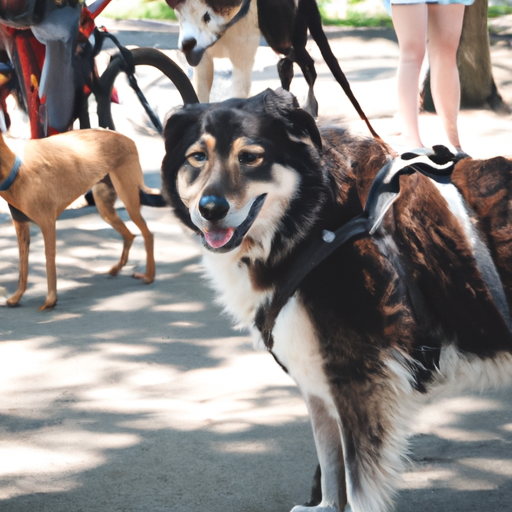Understanding Your Dog’s Behaviour
Firstly, it’s essential to understand why your dog is barking at other dogs during walks. Dogs bark for a variety of reasons: fear, excitement, territorial behavior, or simply because they want to greet the other dog.
- Fear: Fear-based barking is usually accompanied by other signs of anxiety, such as a tucked tail, lowered body, or backing away.
- Excitement: If your dog is wagging its tail and jumping around, it’s probably just excited to see another dog.
- Territorial Behaviour: Dogs are naturally territorial, and they might bark to defend their space.
- Greeting: Just like humans, dogs also bark to say hello to their fellow canines.
Training Your Dog to Stop Barking
Training your dog to stop barking at other dogs on walks requires patience, consistency, and positive reinforcement. Here are some steps you can follow:
- Identify the triggers: Pay close attention to what triggers your dog’s barking. Is it a particular breed? A specific size? Or is it any dog that comes into their line of sight?
- Desensitize and counter-condition: Gradually expose your dog to its triggers at a distance where it doesn’t react and reward calm behavior.
- Teach the ‘quiet’ command: Use a firm but calm voice to tell your dog ‘quiet’ when they start barking. Reward them when they stop barking.
- Consult with a professional: If your dog’s barking becomes uncontrollable, consult with a professional dog trainer or behaviorist.
Tools to Help Manage Your Dog’s Barking
There are several tools available that can help manage your dog’s barking behaviour:
- Head Collars: A head collar can give you more control over your dog’s movements and can help keep them focused on you during walks.
- Training Treats: High-value treats can be a great motivator for your dog during training sessions.
- Clickers: Clickers can be used to mark the exact moment your dog displays the desired behavior.
| Tools | Pros | Cons |
|---|---|---|
| Head Collars | Gives you control, Easy to use | Some dogs might resist it |
| Training Treats | Dogs love them, Effective | Overuse can lead to weight gain |
| Clickers | Precise, Affordable | Requires training to use correctly |
Encountering Other Dogs on Walks
When you encounter other dogs on your walk, it’s crucial to remain calm and confident. Your dog can sense your emotions and will mirror them.
- Create Distance: If you see another dog approaching, create some distance between your dog and the potential trigger.
- Distract Your Dog: Use a toy or treat to distract your dog’s attention away from the other dog.
- Practice Obedience Commands: Regular obedience training can help your dog learn to focus on you instead of the other dogs.
Frequently Asked Questions
Q: How long will it take for my dog to stop barking at other dogs?
A: The time it takes for your dog’s behaviour to change can vary greatly. It depends on the dog, their specific triggers, and the consistency of training.
Q: Can I use a bark collar to stop my dog from barking at other dogs?
A: While bark collars can provide a quick fix, they don’t address the root cause of the barking and can often lead to more harm than good.
Q: Should I avoid other dogs completely?
A: No, avoiding other dogs completely can lead to socialization issues. Instead, expose your dog to other dogs gradually and in controlled situations.



